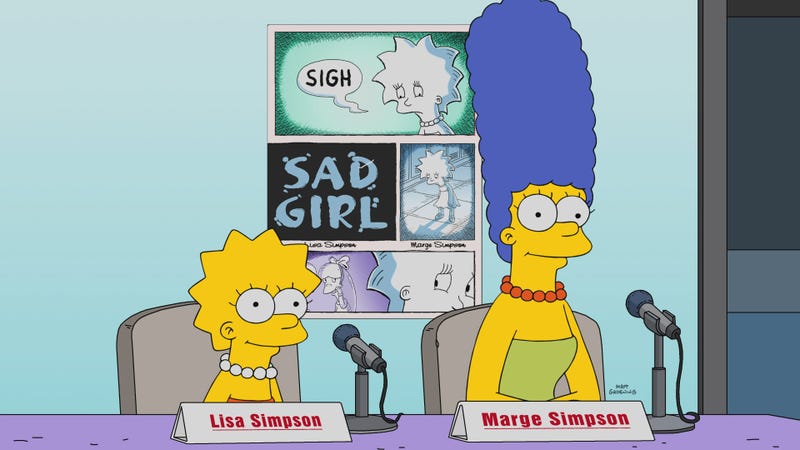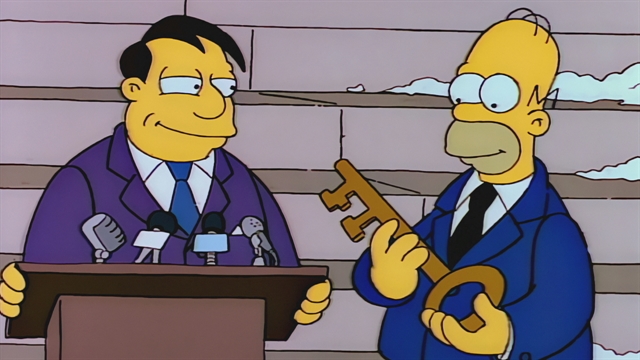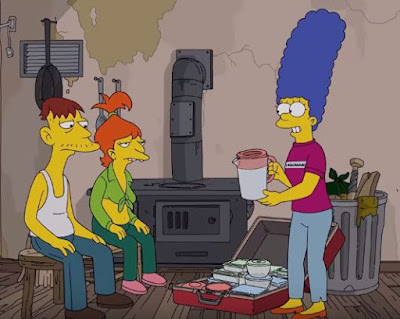How Gender is Portrayed in The Simpsons

Throughout its hundreds of episodes, Lisa and Marge have
always been prominent characters in The
Simpsons. These women both provide the show with strong female characters
who have morals and are dedicated to their beliefs. There are other characters
of both genders, however, which provide a contrast to these people. The actions,
occupations, and thoughts of these people provide the show with multiple views
on various issues, but they also give insight to how the program portrays the
issue of gender. Through analyzing both Lisa and Marge by themselves, as well
as the general depiction of men and women in the show, one can determine that
although women may be empowered in The
Simpsons, their power is undermined by the presence of male characters.
Lisa and Marge often manage to break traditional gender
roles in The Simpsons. Many episodes
involve Lisa engaging in activities which support her love of learning. One
such case is in “The PTA Disbands,” where she becomes so bored in school that
she decides to build a perpetual motion machine. She once led her Little League
baseball team to the championship using statistics. Lisa even used geometry to
help Bart improve at playing mini golf. When benches fall on her in one episode,
Principal Skinner even exclaimed, “She’s been crushed… so have the hopes of our
mathematics team.” Lisa’s yearning for knowledge extends to fields which are
dominated by men. In one episode from season twenty-seven, Lisa decides to take
a class on computer coding. When she does this, she finds herself to be the
only female in a class of thirty students. She eventually manages to become a
successful coder, however, eventually developing an app with the help of other
female coders.

This proves that although Lisa may be challenged by gender
roles, she still manages to do well in her fields of study. Producer Al Jean
even once said of Lisa, “I am so proud that she has become a symbol for those
of like mind,” proving he admires her for how she inspires girls to enter the
fields of math and science. Marge, similarly, performs tasks which are not
typically done by women. Most of these cases involve having a job instead of
staying at home and cleaning the house. In season twenty-seven, for example,
she works for the Springfield Police Department cleaning up crime scenes. In
season thirty, she sells “Tubberware” containers at numerous parties around
town.
When Homer finds out about her ambition to be a salesman, he simply says,
“‘No wife of mine will ever have to work,’ is what men used to say for some
insane reason. You have my blessing.” Through the actions of Lisa and Marge, it
is clear that women have the ability to get jobs and fulfill their ambitions in
The Simpsons.
Despite female characters being able to pursue their
dreams in this show, male characters still manage to overpower them. While some
important jobs, such as teacher and investigative reporter, are held by female
characters, most of the jobs which are highly respected belong to men. These
include the being the mayor of Springfield, a religious leader, a doctor, a
pilot, and a scientist.

None of these positions are held by a single female
character. Instead of holding down prestigious jobs, most of the women in the
show have low-paying jobs or do not work. Maude Flanders, for example, is a
housewife, while Patty and Selma Bouvier work for the Department of Motor
Vehicles. Although there are some male characters with insignificant jobs, men
overall have a better chance of gaining a noteworthy career. In addition,
female characters in this show are called by their pet names more often than
male characters. According to Anna-Karin Mattsson, half of the female names in
the show are short forms for longer names, such as Lisa and Marge being
short for Elizabeth and Margaret. In contrast, only one third of
all the male characters have shortened names. Some male characters, such as Montgomery
Burns, even keep their full name despite how long it is.
This makes men appear
to be more important than the women in the show, given how they are not called
by a shorter variation of their name. The men, however, are highly dependent
upon women for their lives to function. The females in the show usually feed
other characters, while men eat what is served. Women are also expected to act
as faithful people who care for their families. This allows the men in the
show, such as Homer, to live recklessly, push limits, and have an easygoing
nature. Men are also permitted to use violence and aggression against others,
while women are expected to be calm and collected when dealing with a conflict.
Although Homer may strangle Bart for a prank he did, Marge must be diplomatic
when addressing Homer over an issue which upset her. Through men’s dominance in
the workforce, conversation, and the household, the power of the women in The Simpsons become suppressed.
Although The
Simpsons may not be recognized by many for its empowering message to women,
this significant idea is displayed throughout the series. Lisa constantly
strives to excel in the sciences despite some of her fields of interest being dominated
by men. Similarly, Marge obtains various jobs throughout the show instead of
staying in the house and cleaning. The heavy presence of men, however, prevents
these female characters from shining. The males tend to have more prestigious
jobs, call women by lesser names, and engage in reckless behavior. This leads
to most of the female characters working low-paying jobs, having a lower standing,
and tending to have stereotypical feminine traits, such as being faithful and
loving. Despite its strong feminist message in some episodes, The Simpsons will continue to fall short
of inspiring women until the female characters have the same opportunities as
the men in Springfield.
Sources:
Algar, Jessie. "What the Simpsons can teach us about tech and sexism: Twenty-seven years of couch gags makes for the right time to discuss the feminist heavy topic of women’s place in coding." Medium, 21 Jul. 2016. https://medium.com/enspiral-dev-academy/what-the-simpsons-can-teach-us-about-tech-and-sexism-86ba917a6a62
Highfield, Roger. "The Maths Behind the Simpsons' Women." Newsweek, 13 Sep. 2014. https://www.newsweek.com/2014/09/19/maths-behind-simpsons-women-269904.html
Mattsson, Anna-Karin. "Gender in The Simpsons" Bachelor thesis. Luleå University of Technology, 2009, DiVA (URN urn:nbn:se:ltu:diva-54726)
The Simpsons: Season Thirty. Created by Matt Groening, Twentieth Century Fox, 2018-2019.
The Simpsons: Season Twenty-Seven. Created by Matt Groening, Twentieth Century Fox, 2015-2016.


No comments:
Post a Comment